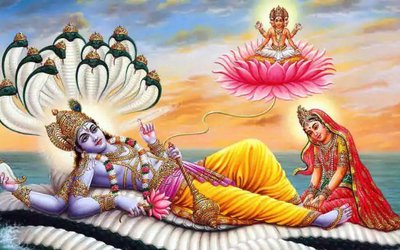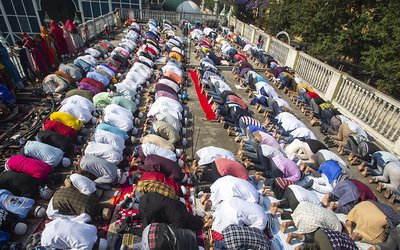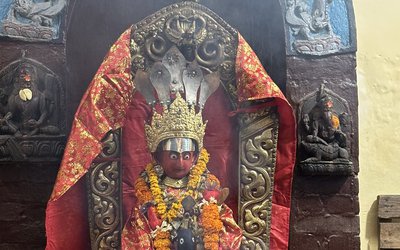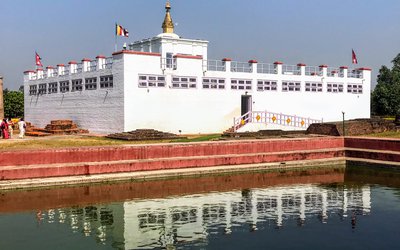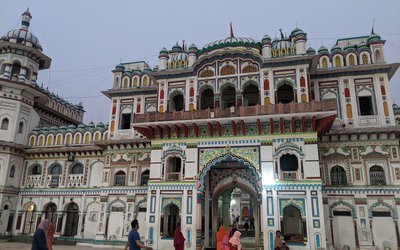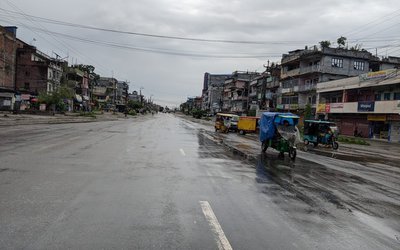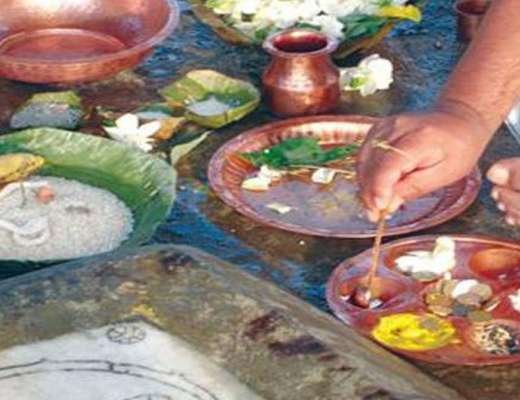
Soraha Shradha begins today. During the 16-day 'Pitru Paksha' people express heartfelt gratitude towards parents who are no more and ancestors.
Shradh or Pitru Paksha is a period when Hindus remember their ancestors by offering prayers. The 16-day period this year begins today and ends on September 17. 'Shradh' is a way of expressing heartfelt gratitude towards parents who are no more, for having helped them be what they are today. According to scriptures, rituals performed during 'shradh' bring peace to the departed.
'Pitru Paksha' is the period from 'Bhadrapada Purnima' to 'Sarvapitri Amavasya'. 'Pitru Paksha' is considered by Hindus to be inauspicious as the death rites are performed during 'Shradh' or 'Tarpan'. The last day of 'Pitru Paksha' is known as 'Sarvapitri Amavasya'. It is also known as 'Pitru Amavasya' or simply 'Mahalaya'. It is the most significant day of 'Pitru Paksha'.
According to Hindu mythology, the souls of three preceding generations of one's ancestor reside in Pitri–loka, a realm between heaven and earth. This realm is governed by Yama, the god of death, who takes the soul of a dying man from earth to Pitri–lok. When a person of the next generation dies, the first generation shifts to heaven and unites with God, so Shraddha offerings are not given. Thus, only the three generations in Pitri–lok are given Shraddha rites, in which Yama plays a significant role. According to the sacred Hindu epics (Itihas), at the beginning of Pitri Paksha, the sun enters the zodiac sign of Virgo (Kanya). Coinciding with this moment, it is believed that the spirits leave Pitri–loka and reside in their descendants' homes for a month until the sun enters the next zodiac—Scorpio (Vrichchhika)—and there is a full moon. Hindus are expected to propitiate the ancestors in the first half, during the dark fortnight.
When the legendary donor Karna died in the epic Mahabharata war, his soul transcended to heaven, where he was offered gold and jewels as food. However, Karna needed real food to eat and asked Indra, the lord of heaven, the reason for serving gold as food. Indra told Karna that he had donated gold all his life, but had never donated food to his ancestors in Shraddha. Karna said that since he was unaware of his ancestors, he never donated anything in their memory. To make amends, Karna was permitted to return to earth for a 16–day period, so that he could perform Shraddha and donate food and water in their memory. This period is now known as Pitri Paksha. In some legends, Yama replaces Indra.
The fifteen days of Malaya Paksha consists of 15 Tithi (also called Thithi). They are Pratipat, Dvitiya, Tritiya, Chaturthi, Panchami, Shashti, Saptami, Ashtami, Navami, Dasami, Ekadasi, Dvadasi, Trayodasi, Chaturdashi, Amavasya (new moon). According to Hindu mythology, every individual who wants to perform this Pitri Tarpan, they should do it on the same day of their ancestor died which will fall within any one of these fifteen days.
The performance of Shraddha by a son during Pitri Paksha is regarded as a compulsory by Hindus, to ensure that the soul of the ancestor goes to heaven. In this context, the scripture Garuda Purana says, "there is no salvation for a man without a son". The scriptures preach that a householder should propitiate ancestors (Pitris), along with the gods (devas), ghosts (bhutas) and guests. The scripture Markandeya Purana says that if the ancestors are content with the shraddhas, they will bestow health, wealth, knowledge and longevity, and ultimately heaven and salvation (moksha) upon the performer.
The performance of Sarvapitri amavasya rites can also compensate a forgotten or neglected annual shraddha ceremony, which should ideally coincide with the death anniversary of the deceased. According to Sharma, the ceremony is central to the concept of lineages. Shraddha involves oblations to three preceding generations—by reciting their names—as well as to the mythical lineage ancestor (gotra). A person thus gets to know the names of six generations (three preceding generation, his own and two succeeding generations—his sons and grandsons) in his life, reaffirming lineage ties. The shraddha is performed on the specific lunar day during the Pitri Paksha, when the ancestor—usually a parent or paternal grandparent—died. There are exceptions to the lunar day rule; special days are allotted for people who died in a particular manner or had a certain status in life. Chautha Bharani and Bharani Panchami, the fourth and fifth lunar day respectively, are allocated for people deceased in the past year. Avidhava navami ("Unwidowed ninth"), the ninth lunar day, is for married women who died before their husband. Widowers invite Brahmin women as guests for their wife's shraddha. The twelfth lunar day is for children and ascetics who had renounced the worldly pleasures. The fourteenth day is known as Ghata chaturdashi or Ghayala chaturdashi, and is reserved for those people killed by arms, in war or suffered a violent death.
Rites of Shraddha
The male who performs the shraddha should be take a purifying bath beforehand and is expected to wear a dhoti. He wears a ring of Kush. Then the ancestors are invoked to reside in the ring. The shraddha is usually performed bare-chested, as the position of the sacred thread worn by him needs to be changed multiple times during the ceremony. The shraddha involves pinda-daan, which is an offering to the ancestors of pindas (cooked rice and barley flour balls mixed with ghee and black sesame seeds), accompanying the release of water from the hand. It is followed by the worship of Vishnu in form of the Kush, a gold image or Shaligram stone and Yama. The food offering is then made, cooked especially for the ceremony on the roof. The offering is considered to be accepted if a crow arrives and devours the food; the bird is believed to be a messenger from Yama or the spirit of the ancestors. A cow and a dog are also fed, and Brahmin priests are also offered food. Once the ancestors (crow) and Brahmins have eaten, the family members can begin lunch.
Shradh 2020: Day and dates
2nd September: Pratipada Shradh
3rd September: Dwitiya Shradh
5th September: Tritiya Shradh
6th September: Chaturthi Shradh
7th September: Panchami Shradh
8th September: Shashthi Shradh
9th September: Saptami Shradh
10th September: Ashtami Shradh
11th September: Navami Shradh
12th September: Dashami Shradh
13th September: Ekadashi Shradh
14th September: Dwadashi Shradh
15th September: Trayodashi Shradh
16th September: Chaturdashi Shradh
17th September: Amavasya Shradh
Shradh rituals
The person who performs the 'shradh' invites the priest at home and performs a 'havan'. Rice and water are offered to the ancestors and this is called the 'pinda pradaana'. Since cows are considered holy by Hindus, food is also offered to them. The priest who helps with the rituals is given specially cooked food and treated with great care. The 'puja' concludes with giving 'dakshina' or a monetary donation to the priest.
- Nepal-UK Tech Forum Held
- Jul 06, 2025
- Hari Sayani or Devshayani Ekadashi 2025: Day Of Tulsi Plantation
- Jul 06, 2025
- Siddhababa Tunnel Makes A Major Milestone
- Jul 06, 2025
- Weather Forecast: Generally Cloudy Across The Country With Heavy Rain At One Or Two Places Gandaki, Bagmati and Koshi Provinces
- Jul 06, 2025
- India’s External Affairs Ministry’s Senior Officials Says Indo-Nepal relations are ever expanding
- Jul 05, 2025

